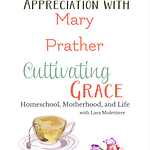This article is for you, my friend -- whether you're new and learning about a Charlotte Mason education or a long-time educator through her methods, or just a parent looking for help in homeschooling an out-of-the-box kid - we're hopeful you'll gain new insights into this important principle. Get comfortable, grab some tea, and relax as we boldly go through the 4th principle and endeavor to create a life-giving Charlotte Mason home.
Listen to this post here:
Charlotte Mason's 20 Principles
If you're just joining our series now, we've been diving deep into Charlotte Mason's 20 principles to grasp the wisdom and 'why' we educate our children using Charlotte Mason's method. Following a Charlotte Mason inspired curriculum is not enough -- we must also truly understand it's significance in our child's education today.
Before dissecting Principle 4, here are deep dives into the first 3 Charlotte Mason Principles:
Now that you're caught up, let us begin with Principle 4's warning -- do not use anger, authority or abuse to 'encourage' a child to learn.
Principle 4: Charlotte Mason Training without fear or intimidation
Principle 4: These principles are limited by the respect due to the personality of children, which must not be encroached upon whether by the direct use of fear or love, suggestion or influence, or by undue play upon any one natural desire.
As parents homeschooling our children, it's easy to get frustrated and focus on what they're NOT doing. Instead, we need a different approach- a NON-totalitarian authority based on respect and trust. We can use what's already built into the souls of our children -- their personalities and learning styles- to foster a love of learning if we cultivate it.
Parents have authority over their children, but in moments of irritation, fatigue, or (dare I say it?) embarrassment - it's tempting to abuse our our authority and position by using fear and influence to force our offspring to obey. Remember, 'do not provoke your children to wrath' is a worthy command to follow.
We are not given permission to manipulate our children. In the above principle, the word suggestion has a meaning much different than how we use it today. The term was more akin to nicely dressed manipulation, such as was used in hypnotic parlor tricks where the person under hypnosis was given "suggestions" that they followed because they were not in control - they were under the power of another.
The warnings Charlotte Mason suggests is not to use fear (ie screaming, yelling), love (If you really loved mommy then you'd . . . ), or influence (aka manipulate). We cannot hold onto the hearts of our children to train them if they do not trust us to respect their personhood.
Use Charlotte Mason Methods for a Healthy Love of Education
Now that we've established the 'do nots' of the Charlotte Mason approach, let's look at how we can teach our children to learn to love learning using Charlotte Mason's philosophy without any of the 3 A's -- abuse, anger, or authority. Instead, we can teach the joy, delight, and beauty of education through daily habit training, hands-on creatives, nature studies, and asking the right sort of questions.
Asking questions to foster connections, creativity, and thoughtfulness
We don't want to break our children's concentration by questioning while they study or observe, nor do we wish to hound them for answers or give away the connections by asking trite questions. But gentle guidance, especially for young narrators, is done through the asking of questions such as:
What did you think about _____?
Why did _____?
What did you learn?
What do you think about _____?
And then give them time to ponder, answer, and find questions of their own. Guide them toward asking these questions of themselves as they begin to read more, grow more, and think more.
As Charlotte Mason was fond of saying, "the mind can know nothing but what it can produce in the form of an answer to a question put by the mind to itself" (School Education).
Here are some enlightening tips straight from Charlotte Mason's volumes.
Keep children focused on learning by moving at his/her own pace. A child tends to daydream when their lessons become dull. This is a bad habit and must be nipped in the bud right away. Instead, keep lessons attractive by varying the lessons and moving on as each individual child's retention is filled. Have some knowledge over the material before setting it in front of your students to keep them motivated and focused.
Encourage children to gain knowledge for wisdom and preparing for life, not using grades, tests, or prizes as manipulation. Have you ever asked yourself why are exams necessary -- do they really benefit a child? Do they truly strengthen their memory of the studied material for a lifetime? Or, what about all of those facts they recite over and over again -- is it just to impress others?We must examine our motivation for tests and quizzes and determine their weight in education. Carefully consider whether examinations waste valuable time or are a value to our children.
Consider the child's personality to ensure they are developing a healthy, self-sufficient person. Some children are born with a more attractive personality -- and they win others' attention simply with a smile. However, they become spoiled and are often overlooked as a reliable individual.It is essential that the child's mind be constantly fed, not their ego or demands. Instead, the main goal with our children must be to produce self-reliant adults with critical thinking skills. But, how? By teaching him to practice his lessons, behave appropriately, building strong virtues and develop good character traits.Once we are convinced that children have a natural curiosity and appetite to learn, our job as a teacher is much less complicated. The teacher who focuses on grades and rewards will temporarily motivate their student but it's short-lived. Instead, there will not be a healthy growth of knowledge and wisdom, with little satisfaction in his occupation as an adult.
Wrapping up, many parents and teachers use the wrong motivational tools to encourage their children to memorize facts, get good scores on tests, and recite large amounts of data. While rewards and recognition temporarily motivate a child, it's not a life long motivation tool. Natural rewards are the greatest motivator -- and will move the child toward developing a love of learning for learnings sake.
Focus on Charlotte Mason habit training and developing godly character traits, one step at a time. What does Charlotte Mason say about habits? Be consistent, calm, and collected at all times. Do not show anger or impatience, but show them unconditional love and gentleness as you train the next generation. And, of course, praise them when they are pleasing their parents and the Lord.
Charlotte Mason Says
As Charlotte Mason quotes in Volume 6, "Our business is to find out how great a mystery a person is qua person. All action comes out of the ideas we hold and if we ponder duly upon personality we shall come to perceive that we cannot commit a greater offence than to maim or crush, or subvert any part of a person." (Chapter 5: The Sacredness of Personality)
Charlotte Mason Resources for further reading on Principle 4:
Home Education - volume 1: page 141: http://amblesideonline.org/CM/vol1complete.html#141
Parents and Children (volume 2) chapter 20: http://amblesideonline.org/CM/vol2complete.html#214
Towards a Philosophy of Education (Volume 6) chapter 5: http://amblesideonline.org/CM/vol6complete.html#080
PNEU article: Should Competition be Encouraged? - http://www.amblesideonline.org/PR/PR12p251Competition.shtml
PNEU article: Motives of Moral Action: http://www.amblesideonline.org/PR/PR12p591MotivesofMoral.shtml

















Share this post